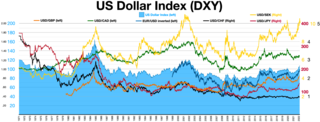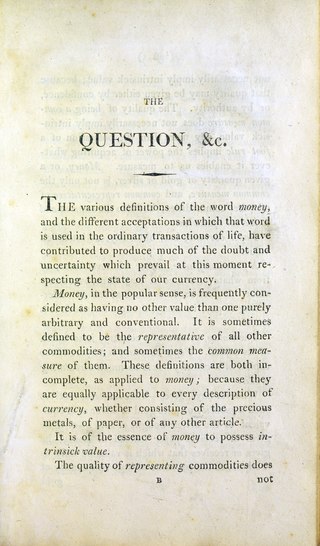Related Research Articles
In economics and finance, arbitrage is the practice of taking advantage of a difference in prices in two or more markets – striking a combination of matching deals to capitalize on the difference, the profit being the difference between the market prices at which the unit is traded. When used by academics, an arbitrage is a transaction that involves no negative cash flow at any probabilistic or temporal state and a positive cash flow in at least one state; in simple terms, it is the possibility of a risk-free profit after transaction costs. For example, an arbitrage opportunity is present when there is the possibility to instantaneously buy something for a low price and sell it for a higher price.

In finance, an exchange rate is the rate at which one currency will be exchanged for another currency. Currencies are most commonly national currencies, but may be sub-national as in the case of Hong Kong or supra-national as in the case of the euro.

Day trading is a form of speculation in securities in which a trader buys and sells a financial instrument within the same trading day, so that all positions are closed before the market closes for the trading day to avoid unmanageable risks and negative price gaps between one day's close and the next day's price at the open. Traders who trade in this capacity are generally classified as speculators. Day trading contrasts with the long-term trades underlying buy-and-hold and value investing strategies. Day trading may require fast trade execution, sometimes as fast as milli-seconds in scalping, therefore direct-access day trading software is often needed.
The money market is a component of the economy that provides short-term funds. The money market deals in short-term loans, generally for a period of a year or less.

The foreign exchange market is a global decentralized or over-the-counter (OTC) market for the trading of currencies. This market determines foreign exchange rates for every currency. It includes all aspects of buying, selling and exchanging currencies at current or determined prices. In terms of trading volume, it is by far the largest market in the world, followed by the credit market.
Foreign exchange reserves are cash and other reserve assets such as gold and silver held by a central bank or other monetary authority that are primarily available to balance payments of the country, influence the foreign exchange rate of its currency, and to maintain confidence in financial markets. Reserves are held in one or more reserve currencies, nowadays mostly the United States dollar and to a lesser extent the euro.
A bureau de change or currency exchange is a business where people can exchange one currency for another.
In finance, a currency swap is an interest rate derivative (IRD). In particular it is a linear IRD, and one of the most liquid benchmark products spanning multiple currencies simultaneously. It has pricing associations with interest rate swaps (IRSs), foreign exchange (FX) rates, and FX swaps (FXSs).
A currency pair is the quotation of the relative value of a currency unit against the unit of another currency in the foreign exchange market. The currency that is used as the reference is called the counter currency, quote currency, or currency and the currency that is quoted in relation is called the base currency or transaction currency.
Electronic Broking Services (EBS) is a wholesale electronic trading platform used to trade on the foreign exchange market (FX) with market-making banks. It was originally created as a partnership by large banks and then became part of CME Group.

Currency depreciation is the loss of value of a country's currency with respect to one or more foreign reference currencies, typically in a floating exchange rate system in which no official currency value is maintained. Currency appreciation in the same context is an increase in the value of the currency. Short-term changes in the value of a currency are reflected in changes in the exchange rate.
Scalping, when used in reference to trading in securities, commodities and foreign exchange, may refer to either
- a legitimate method of arbitrage of small price gaps created by the bid–ask spread, or
- a fraudulent form of market manipulation.
Direct market access (DMA) in financial markets is the electronic trading infrastructure that gives investors wishing to trade in financial instruments a way to interact with the order book of an exchange. Normally, trading on the order book is restricted to broker-dealers and market making firms that are members of the exchange. Using DMA, investment companies and other private traders use the information technology infrastructure of sell side firms such as investment banks and the market access that those firms possess, but control the way a trading transaction is managed themselves rather than passing the order over to the broker's own in-house traders for execution. Today, DMA is often combined with algorithmic trading giving access to many different trading strategies. Certain forms of DMA, most notably "sponsored access", have raised substantial regulatory concerns because of the possibility of a malfunction by an investor to cause widespread market disruption.
In foreign exchange markets, a percentage in point (pip) is a unit of change in an exchange rate of a currency pair. A pip is the smallest whole unit price move that an exchange rate can make, based on forex market convention.

Currency intervention, also known as foreign exchange market intervention or currency manipulation, is a monetary policy operation. It occurs when a government or central bank buys or sells foreign currency in exchange for its own domestic currency, generally with the intention of influencing the exchange rate and trade policy.
Retail foreign exchange trading is a small segment of the larger foreign exchange market where individuals speculate on the exchange rate between different currencies. This segment has developed with the advent of dedicated electronic trading platforms and the internet, which allows individuals to access the global currency markets. As of 2016, it was reported that retail foreign exchange trading represented 5.5% of the whole foreign exchange market.

Matchbook FX was an internet-based electronic communication network for trading currency online in the Spot-FX or foreign exchange market. It operated between 1999 and 2002.
MT4 ECN Bridge is a technology that allows a user to access the interbank foreign exchange market through the MetaTrader 4 (MT4) electronic trading platform. MT4 was designed to allow trading between a broker and its clients, so it did not provide for passing orders through to wholesale forex market via electronic communication networks (ECNs). In response, a number of third-party software companies developed Straight-through processing bridging software to allow the MT4 server to pass orders placed by clients directly to an ECN and feed trade confirmations back automatically.

A currency basket is a portfolio of selected currencies with different weightings. A currency basket is commonly used by investors to minimize the risk of currency fluctuations and also governments when setting the market value of a country's currency.

Interactive Brokers, Inc. (IB), headquartered in Greenwich, Connecticut, is an American multinational brokerage firm. It operates the largest electronic trading platform in the United States by number of daily average revenue trades - in 2023, it processed an average of 3 million trades per trading day. The company brokers stocks, options, futures contracts, EFPs, futures options, forex, bonds, mutual funds, and cryptocurrency. It offers omnibus and non-disclosed broker accounts and provides clearing services to 200 introducing brokers worldwide. It has operations in 34 countries and 27 currencies and has 2.6 million institutional and individual brokerage customers, with total customer equity of $426 billion as of December 31, 2023.
References
- 1 2 3 4 Cheng, Grace (2007). 7 Winning Strategies for Trading Forex. Harriman House Limited. ISBN 978-0857190246.
- ↑ Miller, Rich (30 June 2011). "NYSE's Data Fortress Powering the Financial Cloud". Data Center Knowledge. Retrieved 11 March 2015.